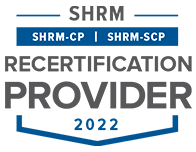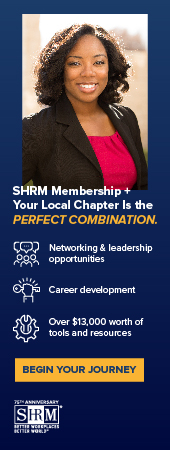Legislative
Legislative
 Montana State Council
Montana State Council
Affiliate of the Society for Human Resource Management
April 2024 Update
MONTANA STATE CONFERENCE – MAKE SURE TO REGISTER SOON!
MAY 1ST – 3RD
Go online and register for the conference in Kalispell!
EOC Releases Final Regulations for Pregnant Workers Fairness Act
April 15, 2024
The U.S. Equal Employment Opportunity Commission (EEOC) final regulations for implementing the Pregnant Workers Fairness Act (PWFA) on April 15th.
After considering more than 100,000 public comments during a 60-day period, the EEOC aimed to clarify definitions and limitations of the law. For example, the PWFA only provides accommodations to qualified employees with limitations related to, affected by or arising out of pregnancy, childbirth or related medical conditions. The EEOC noted that whether a condition constitutes “pregnancy, childbirth, or related medical conditions” will be guided by existing Title VII precedent.
The PWFA, which went into effect on June 27, 2023, requires employers to provide reasonable accommodations for known limitations related to pregnancy, childbirth or related medical conditions unless the accommodation would cause the employer an undue hardship. The law applies to employers with 15 or more employees.
The House Committee on Education and Labor Report on the PWFA provided examples of possible reasonable accommodations, including:
- The ability to sit or drink water.
- Closer parking.
- Flexible hours.
- Appropriately sized uniforms and safety apparel.
- Additional break time to use the bathroom, eat and rest.
- Leave to recover from childbirth.
- Reassignment from activities that are strenuous or involve exposure to compounds that are not safe for pregnancy.
|
SHRM LINK ARTICLE: EEOC Releases Final Regulations for Pregnant Workers Fairness Act (shrm.org)
SHRM GOVERNMENTAL AFFAIRS ADVOCACY REQUEST President Biden has the opportunity to preserve workplace flexibility and predictability by supporting the Congressional Review Act (CRA) resolution, H.J.Res.98, which would effectively overturn the National Labor Relations Board's (NLRB) 2023 final rule on joint employer status. That is why your voice – the voice of HR – is needed, and we ask that you please urge President Biden to support H.J.Res.98. Text NLRB to 52886 or CLICK BELOW to take action Urge Biden to Support H.J.Res.98 to Restore Clarity & Consistency to the Workplace (shrm.org) House Passes WIOA Revamp, Modernizing Workforce Development The nation’s primary workforce development and training law was amended and reauthorized by lawmakers in the U.S. House of Representatives on April 9. Originally enacted in 2014, the Workforce Innovation and Opportunity Act (WIOA) provides funding to state agencies to help job seekers access employment, education, training, and support services. House lawmakers passed the bipartisan H.R.6655 A Stronger Workforce for America Act by a vote of 378-26, with another 26 not voting. The bill now goes to the Senate for consideration. If enacted, the WIOA reauthorization would fund the system through 2030. The reauthorization aims to make improvements to WIOA to help close the national skills gap, provide more accountability in the system, and help U.S. workers obtain high-quality, well-paying jobs. SHRM ARTICLE LINK: House Passes WIOA Revamp, Modernizing Workforce Development (shrm.org) |
| APR 30 |
EEO-1 Filing Period Opens The U.S. Equal Employment Opportunity Commission (EEOC) has announced the 2023 EEO-1 Component 1 data collection will open on April 30. The deadline to file the report is June 4. |
|
| MAY 31 |
|
|
| JUN 23 |
|
WEBCASTS/CONFERENCE SESSIONS
The Heart of HR
April 23, noon ET / 9 a.m. PT
Sponsor: UKG
FMLA: Qualifying Reasons and FAQs
April 25, 2 p.m. ET / 11 a.m. PT
Sponsor: J. J. Keller
Connecting Benefits Literacy and Employee Well-Being
April 25, noon ET / 9 a.m. PT
Sponsor: HealthEquity
|
SHRM’S TOP 5 WORKPLACE POLICY ISSUES TO WATCH IN 2024 Artificial Intelligence (AI) Will Be Regulated and Legislated
UPCOMING CALENDAR EVENTS: WEBCASTS/CONFERENCE SESSIONS SHRM’s International Women’s Day Virtual Retreat The Power of Personalization: Adapting Benefits to Employee Wants and Needs March 14, 2024 | A Conferences for Women Event KEY DATES AND DEADLINES: March 1 March 2 April 14
|
THANK YOU
Supreme Court, NLRB Decisions Changed Employment Law in 2023
The U.S. Supreme Court and federal agencies altered employment law in 2023 with decisions that changed the way employers and employees interact.
The U.S. Supreme Court, in particular, dismantled affirmative action in college admissions, despite the support of many companies for affirmative action, and fortified the standard for religious accommodations.
These opinions dominated the news, but a decision from the National Labor Relations Board (NLRB) that sparked the revision of many employers' handbooks attracted the most readers of any SHRM Online employment law article this year.
Handbooks Need Revision Following NLRB Ruling
Many employer handbooks and policies likely had to be reviewed and revised following a landmark Aug. 2 ruling by the NLRB, Stericycle.
"This ruling, in a word, is huge," said David Pryzbylski, an attorney with Barnes & Thornburg in Indianapolis. "This decision may invalidate countless workplace rules maintained by private-sector employers—whether they are unionized or not."
Supreme Court Dismantles Affirmative Action in College Admissions
On June 29, the U.S. Supreme Court voted in a 6-3 decision to curb affirmative action in higher education. The ruling came in response to a pair of lawsuits accusing Harvard University and the University of North Carolina of racial discrimination in admissions.
In a response to the ruling, SHRM reaffirmed its commitment to advocating for inclusive workplaces and diverse workforces.
Supreme Court Fortifies Standard for Religious Accommodations
The U.S. Supreme Court ruled in a unanimous decision on June 29 that employers can deny an employee's request for a religious accommodation under federal law only if they can prove it would result in substantial increased costs for the businesses.
What Employers Should Know About the Updated Form I-9
U.S. Citizenship and Immigration Services (USCIS) announced July 21 a new Form I-9—which has been streamlined and shortened—that employers could use beginning Aug. 1, 2023. Employers were able to use the older Form I-9 (Rev. 10/21/19) through Oct. 31, 2023.
States Outlaw Noncompete Agreements
A growing number of states have banned noncompete agreements, leaving employers to grapple with a patchwork of different state-level requirements and federal actions.
The End of FMLA Time Off May Be the Start of ADA Leave
Potential leave entitlement doesn't end with the exhaustion of 12 weeks of leave under the FMLA but may be extended for a specified period of time under the ADA, so long as that doesn't result in an undue hardship on the employer. HR needs to coordinate ADA and FMLA obligations, including for health insurance and return to work.
Overtime Would Become Available to Millions More Employees Under Proposed Rule
More workers would be eligible for overtime under a proposed rule released by the DOL on Aug. 30. If the rule is finalized and implemented, overtime protections would be extended to approximately 3.6 million more workers, according to the DOL.
Strikes and NLRB Decisions Transform Labor Relations in 2023
Next Stop for Big Labor: More Organizing
Union organizing will be a primary goal for big labor in 2024, following the recent deals between the United Auto Workers (UAW) and Ford, General Motors and Stellantis. The key question to watch in the next year is whether the UAW's deals with the Big Three automakers—and the Teamsters' agreement with UPS—can be converted into organizing victories at other companies such as Tesla and Amazon.
Lawmakers Disagree on Union Rights
Congressional lawmakers debated conflicting bills related to workers' union rights. Republicans favored the National Right to Work Act, which would prevent labor unions from requiring workers to pay union dues if they don't want to belong to the union.
Democrats supported the Richard L. Trumka Protecting the Right to Organize Act (PRO) Act, which would nullify laws in 28 states that say workers can't be required to join a union or pay union dues as a condition of the job. The PRO Act also would replace secret-ballot union elections with card-check elections and prohibit captive-audience meetings by employers to discuss union activity. Both bills have been introduced but have not passed the House or Senate.
Strikes Not Legal If They Harm Property
A June 1 ruling from the U.S. Supreme Court demonstrated how unions may have to pay hefty penalties if a strike causes damage to a company's property. In Glacier Northwest v. International Brotherhood of Teamsters, the court ruled in favor of an employer that sued in state court after a strike risked significant damage to its trucks. Striking workers must take reasonable precautions to avoid foreseeable, imminent harm to the employer's property.
Rule Changes for Recognizing Unions
On Aug. 25, the NLRB ruled that when a union requests recognition on a card-check basis, an employer must recognize the union or file a petition seeking an election. Previously, if a union demanded recognition based on signed union cards, the employer could decline recognition and the union would need to file a petition with the NLRB.
A separate NLRB decision on Aug. 2 held that an employer violated the National Labor Relations Act (NLRA) by maintaining certain rules for its employees that addressed personal conduct, conflicts of interest and confidentiality of harassment complaints. The NLRB announced a new standard for whether work rules violate the NLRA. Employer handbooks and policies may need to be revised and updated.
Trends HR Should Be Ready For in 2024
The year 2024 looks to be one of amazing potential and ongoing challenges for HR. Talent, economic and supply chain issues are expected to continue, while myriad political views will take center stage during this election year.
The Great Resignation, the Gray Resignation, the Great Regret, the Big Stay, quiet quitting, quiet firing and so many other epithets have developed in recent years for good reason: While the economy is strong and talent scarcity widespread, some employers have embraced layoffs as the best way to manage their bottom line.
The erratic pressures and “polycrises” of global wars, labor strikes, technology disruption, stock market and interest rate gyrations, political turmoil, gun violence, immigration, climate change, and so many other social issues pervade the workplace. Simply put, many employees are exhausted, confused and overwhelmed. The pace of change will only exacerbate these problems, leaving workers constantly putting out fires, at work and at home. These realities pose both opportunities and threats to HR leaders of organizations large and small.
SHRM Article Link: Trends HR Should Be Ready For in 2024 (shrm.org)
UPCOMING CALENDAR EVENTS:
WEBCASTS/CONFERENCE SESSIONS
Workplace Compliance Trends for 2024
Jan. 17, 2 p.m. ET / 11 a.m. PT
The Future of Digital Health and What it Means for Your Workforce in 2024
Jan. 30, 2 p.m. ET / 11 a.m. PT
Building a Sense of Belonging at Work in 2024
Jan. 22, 2 p.m. ET / 11 a.m. PT
| FEB 26 |
NLRB Expands Definition of Joint Employer The National Labor Relations Board (NLRB) released a final rule on Oct. 26 to provide a broadened standard for when two employers that conduct business together are considered to be joint employers and thus liable for one another’s unfair labor practices. It will take effect on Feb. 26. |
| APR 14 |
SHRM Talent Conference & Expo 2024 (Through April 17 in Las Vegas and virtually) Engage with top industry experts and thought leaders delivering cutting-edge methods and processes to transform the way you manage talent and empower your organization to succeed in an ever-evolving job market. |
Thank You.
Montana SHRM well represented at SHRM VBLM in Washington DC
Thank you Dawn Lambert, Amanda Kieth, Rayne Hoover, Alyssa Bernhardt and Sarah Raymond for your involvement and participation in the VBLM Conference last month in Washington DC! You all made Montana SHRM proud.

Join the Montana SHRM State Council Mailing List
Need the 2022 conference information? Please check out the information on the WHOVA web app: https://whova.com/



.png)



